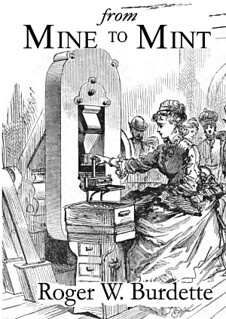
Author Roger Burdette will be speaking next weekend to the Virginia Numismatic Association. -Editor
 Numismatic author Roger W. Burdette will be the featured speaker at the Virginia Numismatic Association dinner on September 28, 2019 in Fredericksburg, VA. His subject
is based on the award winning book, From Mine to Mint. Technology and Operations of American Coinage. Numismatic author Roger W. Burdette will be the featured speaker at the Virginia Numismatic Association dinner on September 28, 2019 in Fredericksburg, VA. His subject
is based on the award winning book, From Mine to Mint. Technology and Operations of American Coinage.
From Mine to Mint is about technology and methodology of our mints as they changed over time. Mr. Burdette will discuss these aspects of coinage through the perspective
of the sources of power (energy) available to our mints.
All coins, medals, tokens paper currency and other things we collect are products of manufacturing processes. The U.S. Mints, like other factories, manufacture coins and medals
using current technology – equipment, power sources, technology, metallurgy and available methodologies.
The power to manufacture coins and medals can be grouped into three distinct sources: muscle, steam engine, and electricity.
Muscle Age (not a magazine for body builders)
In its early phase, for approximately 40 years, the Philadelphia Mint was dependent on muscle power – the muscle of men to move the broad arms of a fly press – the muscle of
horses to move a turnstile connected to iron rollers for flattening gold and silver, and turning cutting lathes.
Steam Age
The middle phase, from 1815 when a 10-horsepower steam engine replaced horses in powering the rolling mills, began in earnest only in 1836. Franklin Peale returned from an
extensive research trip to Europe and designed minting equipment to run on fire, water, steam to move wheezing pistons and drive long leather power belts.
Electric Age
The last energy change was by far the most profound. Electric power brought many improvements in mint operations. These included such obvious things as ability to easily add
equipment and reduced floor space needed for presses, and greater consistency of product. Among less self-evident changes greatly improved furnaces, elimination of coal and gas
for most melting and annealing operations, automation of planchet weight sorting, improved employee safety through elimination of open flywheels, gradual Treasury improvement in
distribution with greater emphasis on commercial need. Refining became a simpler, much higher quality operation through electrolytic cells instead of boiling acids.
For more information on the Virginia Numismatic Association show, see:
http://www.vnaonline.org/

Wayne Homren, Editor
The Numismatic Bibliomania Society is a non-profit organization
promoting numismatic literature. See our web site at coinbooks.org.
To submit items for publication in The E-Sylum, write to the Editor
at this address: whomren@gmail.com
To subscribe go to: https://my.binhost.com/lists/listinfo/esylum
Copyright © 1998 - 2024 The Numismatic Bibliomania Society (NBS)
All Rights Reserved.
NBS Home Page
Contact the NBS webmaster
| 


